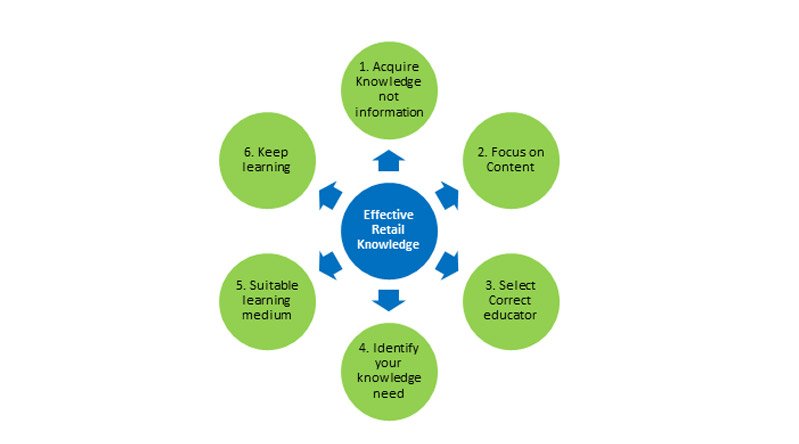
How to develop effective retail knowledge?
Answer to this question that instantly comes to our mind is internet research. Using the laptop or desktop or smart phone is the only thing one needs to do to gather all information on a subject. We all know how promptly the search engines can help retail knowledge seekers by throwing hundreds of links on any retail topic at the click of search button. The regular news feeds by industry portals keep updating retail professionals on happenings in the retail industry. As knowledge pieces, insights on the market trends and consumer behaviour are frequently reported by research firms. Retail employees’ get their work-related knowledge by talking to colleagues and business associates. Companies also conduct diverse training programs to expand employees’ knowledge base. So, what more retail knowledge is required? If the answer is ‘none’ then the question becomes redundant.
However, reality is different from our perception. Despite having such comforts of retrieving knowledge-at-will, retail professionals are often found asking for more. This is because the urge for retail knowledge is either momentary or official compulsion when faced with sudden query or work challenge or while preparing presentations to senior managers. Other causes include not defining the purpose of knowledge; non-clarity on kind of knowledge to be acquired; and, a casual or whimsical approach adopted to acquire retail knowledge. Therefore, it becomes important to develop right attitude, follow well defined process and set knowledge goals to achieve effective knowledge. We do same in retail business as well then why not do it in creating knowledge wealth for self?
It must be understood that knowledge is a potent combination of awareness, information and skill as in the case of driving a car. After learning driving you need constant practice to master the skill of driving. The polished skill enables you to drive on difficult as well as smooth roads with equal confidence. The most productive outcome of skilful driving is the acquisition of life-long driving skill which can never be forgotten, only cars and roads keep changing. This is how one’s retail knowledge should be.

With same objective, 6 key points have been listed which can help one in developing the effective retail knowledge:-
1. Sift retail knowledge from retail information
Retail knowledge should not be confused with retail information. The abundant information we get from news feeds, media and other sources keeps changing frequently. The abundance of that makes it chaotic and frequent updating impart it instable consistency. Awareness to such information is a good habit but that does not necessarily translate into an effective knowledge. To transform such information into effective knowledge it needs to be periodically tracked on set parameters and analysed purposefully. For instance, retail expansion is very common news but if we track and analyse retail expansion segment or format wise we get to know the expansion trend specifically for that segment or format. That would be more useful knowledge than knowing announced numbers of new stores.
2. Focus on content not showbiz
Most common mistake people make is to go for all sorts of knowledge that is ‘freely’ available. They do not want to spend money on quality and content but unknowingly get swayed by nicely edited videos, number of subscribers/followers on social media, good looking presenter and even general talks in the name of retail topics. This is why one must learn to differentiate between the knowledgeable content and general talks. For instance, if you register for a webinar with title “Learning KPIs” and the speaker keeps delivering motivational talks instead of showing what, why, when and how of KPIs then you have wasted your time and energy. So start valuing your urge to gain knowledge first and do not shy from paying for the quality one too. Price paid compels the knowledge provider to provide quality knowledge and also makes the learner value the acquired knowledge more than the knowledge that he/she would have got free. Remember there are no free lunches in this world.
3. Find correct educator for yourself
Knowledge seekers seldom know the difference between a trainer, coach, teacher and consultant. For most of them all are same as long as they talk retail. This is one of the biggest mistakes which most of learners make and gets trapped. You need to assess carefully whom do you need. A teacher is for aspirers, students and amateur learners who can introduce them to basics of retail and tests them too. A trainer imparts and develops retail skills in the learner that requires practice while a coach is someone who is hired to guide and upgrade competencies of individuals or in some cases for a group of people. Coach works on a pre-agreed and mutually-decided plan and progress is monitored accordingly. Lastly, consultant is someone who consults your business. He/she helps you identify your problem area and advises a solution for that. So, you need to find out who do you need for yourself. Do not go by herd mentality instead use your discretion based on this piece of advice.
4. Identify self with the knowledge you need
The senior managers, entrepreneurs, consultants and retail business owners are more interested in corporate news, government policies, industry research, trade practices and networking so they need to be more knowledgeable in these areas. Retail employees need to perform in their respective work areas and retail aspirers & students need basic education and training of retail. You need to identify which category you belong to before deciding on your retail knowledge needs. Information provided by media news, industry developments and market research is perfect for first set of knowledge seekers. Retail knowledge requirements of second set of people is largely taken care by the company they work for. Company’s training and development programs provide them with knowhow of processes & systems, product knowledge and other work-related behaviourial & skill sets. However, these are mostly company-centric which may or may not help the employees in their next job. The third set of learners needs to be all-rounder and try to gain all theoretical, technical and practical knowledge of retail business. They need to learn all aspects of retail including sale, customer service, buying, merchandising, technology etc. to be battle-ready before they join the industry. So find out suitable knowledge for yourself and work in a direction that helps you to acquire it.
5. Choose the appropriate medium of learning
The selection of right learning medium is equally important in the quest of gaining retail knowledge. Technology is the new and flourishing medium despite lacking the personal connect and playful-interactive vibrancy of live training programs stretched over entire day. It is true that traditional training methodologies are gradually fading away but the impact it creates is different from online webinars, youtube videos and podcasts of few minutes to few hours. More so, they are mostly one-sided too. Nevertheless this does not mean that learner should avoid such learning medium. Research shows that digital medium is going to grow immensely in next few years. As you move up in the pyramid of learners from student/amateur set of people to senior managers/consultants, the learning content keeps getting shorter & crisper but needs to be impactful & focused. This calls for offline medium for beginners and online for experienced learners. So opt for suitable medium for yourself depending on what kind of audience you are. This will further depend on your choice of topic for learning – new one or already known one.
6. Continue with non-stop learning
Retail is a busy profession that brings scarcity of time with it. This is the most quoted reason, if not excuse, by retail professionals for stopping further learning. They find contentment in their company’s training and development. As such programs are already company-centric the learning inadvertently ends up being limited. Such people have to again undergo new ‘knowledges’ when they change company. Research has also shown that the more you learn beyond your work area the more knowledgable you become about your industry and its skills. Additionally, one grows as dynamic professional. Constantly expanding the retail knowledge and skill is very important especially for retail employees who have the distinction to practically apply the learning in personal as well as professional life.

